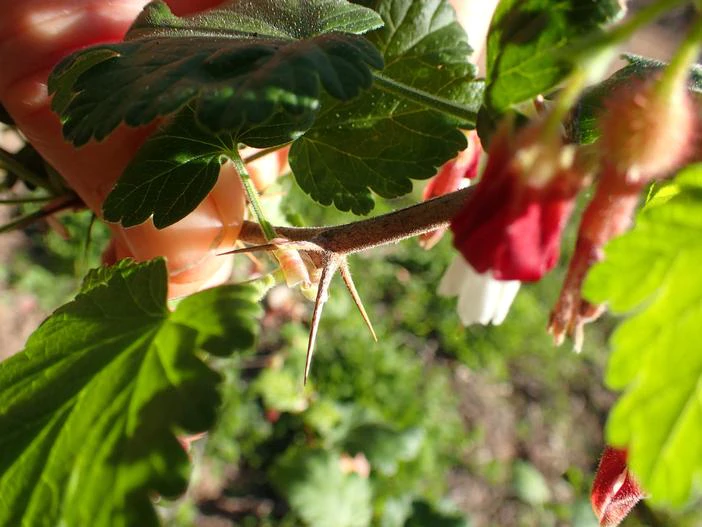Bitter Gooseberry
/
(Ribes amarum)
Bitter Gooseberry (Ribes amarum)
/

George Williams
CC BY 4.0
Image By:
George Williams
Recorded By:
Copyright:
CC BY 4.0
Copyright Notice:
Photo by: George Williams | License Type: CC BY 4.0 | License URL: http://creativecommons.org/licenses/by/4.0/ | Occurence ID: https://www.gbif.org/occurrence/4522760102 | Publisher: Inaturalist |






















Summary
Ribes amarum, commonly known as Bitter Gooseberry, is a deciduous shrub native to the chaparral, coastal sage scrub, and montane forest habitats of California, particularly in the mountains, foothills, and canyons. It typically grows to a height of one to two meters (40-80 inches). The plant is notable for its spiny stems, with nodes bearing three spines up to a centimeter (0.4 inch) in length. The leaves are hairy, glandular, 2 to 4 centimeters (0.8-1.6 inches) long, rounded, and divided into 3 to 5 toothed lobes. Bitter Gooseberry produces a solitary flower or a raceme of up to three flowers from leaf axils. The flowers are quite showy, with five reflexed, pointed sepals in shades of purple-red and a tubular corolla of white or pink-tinged petals, encircling five stamens and two styles. The fruit is a bristly berry, bright red when young and ripening to purple, up to 2 centimeters wide.
This shrub is appreciated for its drought tolerance and its ability to thrive in a variety of light conditions, from full sun to full shade. It is often used in native plant gardens, wildlife gardens, and for erosion control due to its extensive root system. Bitter Gooseberry requires low amounts of water and prefers soils with medium to fast drainage. While it is not commonly used for culinary purposes due to its bitterness, it is valued for its ornamental flowers and berries. Gardeners should be cautious as the spines can make handling difficult, and the plant may spread if conditions are favorable.CC BY-SA 4.0
This shrub is appreciated for its drought tolerance and its ability to thrive in a variety of light conditions, from full sun to full shade. It is often used in native plant gardens, wildlife gardens, and for erosion control due to its extensive root system. Bitter Gooseberry requires low amounts of water and prefers soils with medium to fast drainage. While it is not commonly used for culinary purposes due to its bitterness, it is valued for its ornamental flowers and berries. Gardeners should be cautious as the spines can make handling difficult, and the plant may spread if conditions are favorable.CC BY-SA 4.0
Plant Description
- Plant Type: Shrub
- Height: 4-6 feet
- Width: 1-2 feet
- Growth Rate: Moderate
- Flower Color: Red, White, Pink, Purple
- Flowering Season: Spring
- Leaf Retention: Deciduous
Growth Requirements
- Sun: Full Sun, Part Shade, Full Shade
- Drainage: Medium, Fast
Common Uses
Bee Garden, Bird Garden, Butterfly Garden, Deer Resistant, Drought Tolerant, Fragrant, Hummingbird Garden, Low Maintenance, Rabbit Resistant
Natural Habitat
Native to chaparral, coastal sage scrub, and montane forests within California
Other Names
Common Names:
Scientific Names: Ribes amarum, Ribes amarum var. hoffmanni, Ribes amarum var. amarum, Ribes mariposanum, Grossularia amarum, Ribes anarum, Ribes hesperium var. amarum, Ribes menziesii var. amarum
GBIF Accepted Name: Ribes amarum Mc Clatchie
